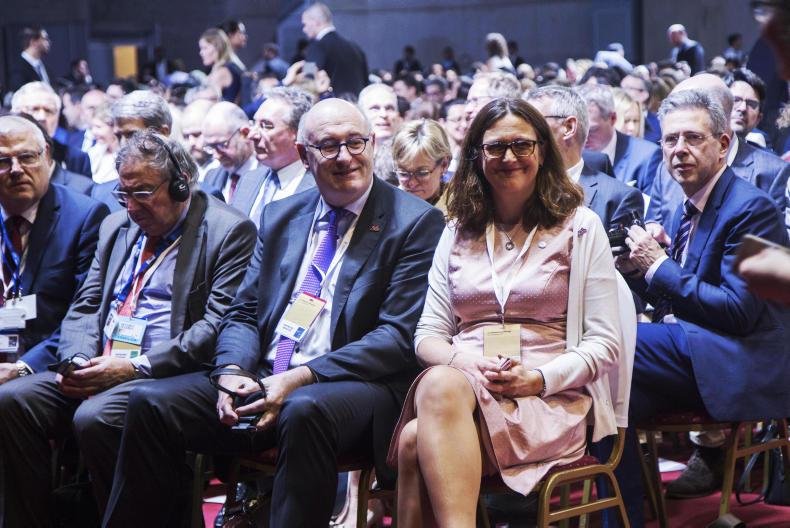When EU Commission President Elect Ursula von der Leyen reveals the portfolios allocated to her team of Commissioners in Brussels today, the least surprising will be the move of Phil Hogan from Agriculture to Trade.
In many ways his term as Agriculture Commissioner prepared him for taking over one of the most senior portfolios in the EU Commission.
He was the most travelled Agriculture Commissioner ever, leading trade missions around the world and he was constantly at the side of outgoing Trade Commissioner, Cecelia Malmstrom in the concluding stage of trade negotiations.
Mercosur
In June he faced an outcry from beef farmers in Ireland and indeed across the EU with the Mercosur trade deal giving the South Americans access for 99,000t of beef at a low tariff to the EU Market.
In many ways this was the final confirmation of his credentials for the job – a willingness to get the deal done.
Despite him highlighting the safeguards for beef sector including a €1bn support fund if necessary as well as Brazil’s compliance with the Paris accord on climate change, he has a big job ahead to sell this deal to the EU institutions and member states, and it is unlikely that EU beef producers will ever be convinced.
In making trade deals, agriculture is usually one of the final sticking points, and just as he was there in the finals stages of negotiation on Mercosur he was also the last man talking when it came to concluding the EU – Japan deal which came into effect earlier this year and unlike Mercosur is one of the most farmer friendly trade deals ever agreed by the EU with only opportunities for EU agricultural exports.
As he moves over to Trade, he will assume responsibility for all categories but he will be particularly up to speed on the sensitivities of granting access for agricultural produce, particularly beef.
What’s on the agenda?
Moving Mercosur from a political agreement to approval and implementation will be a huge challenge, particularly with the backdrop of further destruction of the Amazon rain forest never mind undertaking the ambitious replanting that Brazil is committed to in the Mercosur deal. The EU Parliament will have to approve the deal and with the surge in green party members as well as the other groupings all competing with each other to emphasise their green credentials, we can expect quite a debate.
Aside from Mercosur, the trade negotiations with Australia and New Zealand are progressing and expected to come to a conclusion early in the term of the incoming Commission.
Both countries are looking for greatly enhanced access to the EU, with the Australians in particular envious of the privileged level of sheep meat access New Zealand has enjoyed since the UK joined the then EEC in 1973.
Australia is expecting enhanced access for sheep meat and beef while New Zealand will look for beef access. All of these are potentially bad news for Irish farmers.
Brexit and Trump
In the wider trade context there are two huge challenges.
The first and most immediate is that the day he is due to take up his new job is also the first day the UK is due to be outside the EU. As trade Commissioner, he will be leading the EU negotiation with the UK on a future post Brexit trade deal and if the withdrawal process is any indication, a future trade deal negotiation will be extremely difficult.
The other big challenge is managing the Trade relationship with the USA, particularly if President Trump is re-elected in November next year and even before as he campaigns for re-election.
So far he has focused on China and local spats with Canada and Mexico but the EU has also been in his line of fire, especially in relation to EU car exports to the USA and the refusal of the EU to accept US hormone treated beef.
This was a big factor in TTIP (Transatlantic Trade and Investment Partnership) stalling before President Trump came to power but in any case he stopped that negotiation. So far tariffs have been avoided but they have been close and this is a relationship that will require careful management by the incoming Trade Commissioner.
Approval process
Commissioners are appointed for a five-year term starting on 1 November and the nominees announced by the incoming Commission President are vetted by the relevant committees of the EU Parliament with a report sent to the President of the Parliament.
An unfavourable outcome of the vetting process has led to the withdrawal of Commission candidates and the entire Commission is ratified by a vote in Parliament.






 This is a subscriber-only article
This is a subscriber-only article










SHARING OPTIONS: